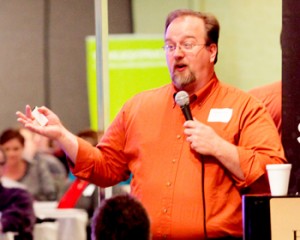I’ll be speaking at the Revenue North Indianapolis conference on March 21, 2013 at the Wyndham Indianapolis West Hotel. It starts at 8:00 am and runs until 5:00 pm, and they’re expecting close to 1000 people.
Passes are normally $99 for individuals and $299 for companies sending up to 5 people. But if you use my special promo code, A28LG7, you can get the individual pass for FREE.
You can see the full conference schedule here. Some of the speakers will include Doug Karr speaking about the Dangers of SEO; Kyle Lacy’s dad Dan speaking on Transforming Your Business; networking specialist Jamar Cobb-Denard will tell you to Stop Wasting Time Networking; my mentor Lorraine Ball of Roundpeg will tell you Why People Hate Your Website; and, I’m speaking about your 10 Professional Branding Secrets.
There are nearly 100 breakout sessions throughout the day, so you’re going to get your head crammed with a lot of great information.